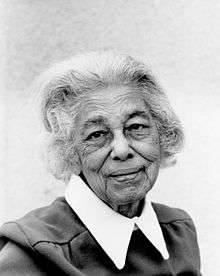Beatrice Morrow Cannady
| Beatrice Morrow Cannady | |
|---|---|
 | |
| Born | January 9, 1890 |
| Died | August 19, 1974 (aged 84) |
| Nationality | American |
| Alma mater | Northwestern College of Law |
| Occupation | publisher, civil rights activist |
| Spouse(s) | Edward Daniel Cannady |
Beatrice Morrow Cannady (January 9, 1890 – August 19, 1974)[1] was a renowned civil rights advocate in early 20th-century Oregon, United States. She was editor of the Advocate, the state's largest African-American newspaper.[2] She was also one of the founders of Oregon's chapter of the NAACP.[3]
Life
In 1910 Cannady moved from Texas to Portland, Oregon; there, she met Edward Daniel Cannady, editor and co-founder of the Advocate.[4] The couple had two sons together, George (1913-1968) and Ivan (1915-1987).[5] During World War I, Beatrice mobilized African-American women for the war effort, as president of the Colonel Charles Young War Savings Club, and as head of a local Red Cross Auxiliary's "knitting unit."[6]
She graduated from Northwestern College of Law in 1922, and was one of the first black women to graduate from law school in the United States.[3] In 1932 she ran (unsuccessfully) for a seat in the Oregon House of Representatives.[2]
Cannady moved to Los Angeles in 1938, where she wrote for the Precinct Reporter and married Reuben Taylor as her third husband. She also converted to Baha'ism in her later years. Beatrice Morrow Cannady Taylor died August 19, 1974, in Los Angeles.[7]
Biography
The "first book-length scholarly treatment of Beatrice Morrow Cannady":[8]
Mangun, Kimberley (2010). A force for change: Beatrice Morrow Cannady and the struggle for civil rights in Oregon, 1912–1936. Corvallis: Oregon State University Press. ISBN 978-0870715808.
References
- ↑ Kimberley Mangun, "A Force for Change: Beatrice Morrow Cannady's Program for Race Relations in Oregon, 1912-1936," Pacific Northwest Quarterly 96(2)(Spring 2005): 69.
- 1 2 "Beatrice Morrow Cannady". The Oregon Encyclopedia.
- 1 2 Shirley, Gayle C. (2010). More than Petticoats: Remarkable Oregon Women (2nd ed.). Guilford, Conn.: Globe Pequot Press. ISBN 978-0762758661.
- ↑ Karol, Gayle (February 15, 2008). "1889-1974: Beatrice Cannady, early voice for civil rights". The Oregonian.
- ↑ "Beatrice Hulon Morrow Cannady Franklin Taylor (1889 - 1974) - Find A Grave Memorial". findagrave.com. Retrieved 21 January 2015.
- ↑ "Colored Boy, Aged 5, Helps Uncle Sam," The Oregonian (May 5, 1918), reproduced at http://www.findagrave.com/cgi-bin/fg.cgi?page=gr&GRid=94206757
- ↑ Kimberley Mangun, "Beatrice Morrow Cannady and the Struggle for Civil Rights in Oregon," The Black Past: Remembered and Reclaimed (excerpt adapted from the full-length biography).
- ↑ Oregon Historical Quarterly review
External links
- Beatrice Morrow Cannady Documentary produced by Oregon Public Broadcasting